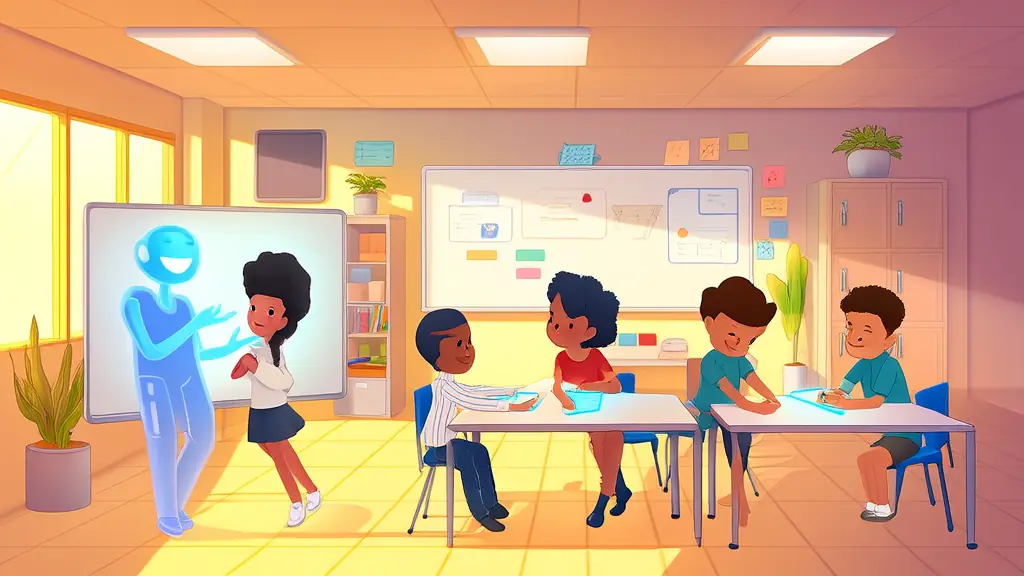
www.uitgedu.com | 自然英语拼读 | KET | PET | 英语点读学习资料
Empowering the Future: Navigating K12 Education in 2025
Welcome to our exploration of the ever-evolving landscape of K12 education. As we stand on the cusp of a new era, it's crucial for parents and educators to stay informed about the latest trends, methodologies, and technologies that are shaping the way our children learn and grow. In this blog post, we'll delve into cutting-edge teaching approaches, child development insights, educational technology, and practical tips that can make a significant difference in the classroom and at home. Let's embark on this journey together to ensure that our future generations are well-equipped to thrive in an increasingly complex world.
Latest Teaching Methodologies and Their Effectiveness
The traditional one-size-fits-all approach to education is giving way to more personalized and engaging methods. One such methodology gaining traction is project-based learning (PBL). PBL encourages students to explore real-world problems and challenges, fostering critical thinking, collaboration, and creativity. For example, a high school in California implemented a PBL program where students worked on a project to design sustainable solutions for their local community. The results were impressive, with students not only excelling academically but also developing a deeper sense of civic responsibility.
Another effective approach is blended learning, which combines traditional face-to-face classroom instruction with online digital media. This hybrid model allows for greater flexibility and personalization, catering to the diverse needs of students. A case study from a middle school in Texas showed that blended learning led to a 15% improvement in student performance and a 20% increase in student engagement.
Child Development Insights and Research
Understanding child development is key to creating effective learning environments. Recent research has highlighted the importance of social-emotional learning (SEL) in K12 education. SEL helps students develop essential life skills such as self-awareness, self-management, social awareness, relationship skills, and responsible decision-making. A study by the Collaborative for Academic, Social, and Emotional Learning (CASEL) found that schools implementing SEL programs saw a 9% increase in academic achievement and a 14% reduction in behavioral issues.
Additionally, the role of play-based learning in early childhood education has been widely recognized. Play is not just fun; it is a fundamental part of cognitive, physical, and emotional development. A kindergarten in New York City integrated play-based learning into their curriculum, resulting in improved language skills, problem-solving abilities, and social interactions among young children.
Educational Technology Trends
Technology continues to transform the educational landscape, offering new tools and platforms that enhance learning experiences. Artificial intelligence (AI) is one of the most promising trends, providing personalized learning paths and adaptive assessments. AI-powered platforms like DreamBox Learning and Carnegie Learning use data analytics to tailor content to each student's unique needs, leading to more effective and efficient learning.
Virtual and augmented reality (VR/AR) are also making waves in K12 education. These immersive technologies create interactive and engaging learning experiences. For instance, a history class in Florida used VR to take students on a virtual tour of ancient Rome, allowing them to explore historical sites and artifacts in a way that textbooks alone could never achieve. This hands-on, experiential learning has been shown to improve retention and understanding of complex concepts.
Practical Tips for Parents and Teachers
For parents, staying involved in your child's education is crucial. Here are some practical tips:
- Communicate regularly with teachers: Keep an open line of communication to stay informed about your child's progress and any areas that may need extra support.
- Create a supportive home environment: Establish a dedicated study space and set a consistent routine to help your child stay organized and focused.
- Encourage curiosity and exploration: Foster a love for learning by exposing your child to a variety of subjects and activities, and encourage them to ask questions and seek answers.
For teachers, here are some actionable strategies:
- Embrace technology: Integrate educational technology tools that can enhance your teaching and provide personalized learning experiences for your students.
- Promote social-emotional learning: Incorporate SEL activities and discussions into your daily lessons to help students develop essential life skills.
- Collaborate with colleagues: Share best practices and resources with other educators to continuously improve your teaching methods and stay up-to-date with the latest trends.
Conclusion
As we navigate the dynamic world of K12 education, it's clear that innovation and adaptability are key. By embracing the latest teaching methodologies, understanding child development, leveraging educational technology, and following practical tips, we can create enriching and effective learning environments for our children. Let's work together to empower the next generation and pave the way for a brighter future. If you have any success stories or experiences to share, please leave a comment below. We'd love to hear from you!